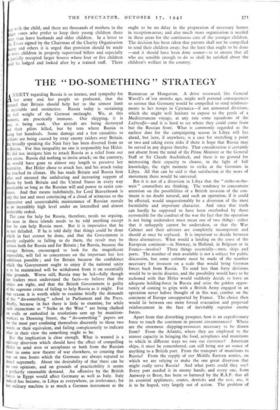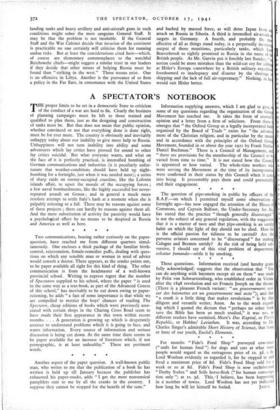THE " DO-SOMETHING " STRATEGY
NXIETY regarding Russia is so intense, and sympathy for her army and her people so profound, that the mand that Britain should help her to the utmost limit inevitable and mstinctive. Russia today is sustaining full weight of the German onslaught. We, at this oment, are practically immune. Our shipping, it is , is being sunk. Our aircraft are being destroyed their pilots killed, but by tens where Russia is piing her hundreds. Some damage and a few casualties to vilians are being caused by stray' enemy raiders over Britain. ut broadly speaking the Nazi fury has been diverted from us Russia. For that inequality no one is responsible but Hitler. did not instigate him to attack Russia as a relief from our wn stress. Russia did nothing to invite attack; on the contrary, she would have gone to almost any length to preserve her eutrality. But Hitler chose to attack her, and his attack today s reached its climax. He has made Britain and Russia firm ies and ensured the unfaltering and increasing support of Russia by both Britain and the United States in every way practicable so long as the Russian will and power to resist con- ues. And that means indefinitely, for Lord Beaverbrook is only the last and most convincing of a cloud of witnesses to the impressive and unmistakable maintenance of Russian morale at an incredibly high level under an intensified and almost intolerable ordeal.
The case for help for Russia, therefore, needs no arguing. No man in these islands needs to be told anything except how he can help Russia most. But it is imperative that he be not deluded. If he is told daily that things could be done which in fact cannot be done, and that the Government is grossly culpable in failing to do them, the result may be serious both for Russia and for Britain ; for Russia, because the average Briton, encouraged to look for the magnificent impossible, will fail to concentrate on the important but less ambitious possible ; and for Britain because the confidence which the Government ought to enjoy if the national unity is to be maintained will be withdrawn from it on essentially false grounds. Worse still, Russia may be led—fully though her leaders must understand the facts—to believe that the critics are right, and that the British Government is guilty of the supreme crime of failing to help Russia as it might. For that reason it is worth while to examine briefly the demands of the " do-something " school in Parliament and the Press. Briefly, because in fact there is little to examine, for while such injunctions as " Strike in the West " are being chalked on walls or embodied in resolutions sent up by munition- workers to Downing Street, the " do-something " papers are for the most part confining themselves discreetly to those two words or their equivalent, and failing conspicuously to indicate what in their view the something ought to be.
But the implication is clear enough. What is wanted is a military diversion which should have the effect of compelling Hitler to send men or aeroplanes or both from the Russian front to some new theatre of war elsewhere, so creating that war on two fronts which the Germans are always reputed to dread supremely. About the desirability of that there can be no two opinions, and on grounds of practicability it seems a perfectly reasonable demand. An offensive by the British forces in Egypt would affect Germany as well as Italy. Italy indeed has become, in Libya as everywhere, an irrelevance, for her military machine is as much a German instrument as the Rumanian or Hungarian. A drive westward, like General Wavell's of ten months ago, might well portend consequences so serious that Germany would be compelled to send reinforce- ments to her troops in Cyrenaica—if not armoured divisions, which she might well hesitate to expose to the penis of a Mediterranean voyage, at any rate some squadrons of the Luftwaffe—and it is hard to see where they could come from but the Russian front. What is commonly regarded as the earliest date for the campaigning season in Libya still lies ahead, but here, if anywhere, is a case for stretching a point or two and taking extra risks if there is hope that Russia may be served in any degree thereby. That consideration is certainly not absent from the mind of the Prime Minister or the General Staff or Sir Claude Auchinleck, and there is no ground for mistrusting their capacity to choose, in the light of full knowledge, the right moment to strike at the Germans in Libya. All that can be said is that satisfaction at the news of movement there would be universal.
But it is not of a diversion in Libya that the " strike-m-the- weSt " counsellors are thinking. The tendency to concentrate attention on the possibilities of a British invasion of the con- tinent is no doubt natural, and such an operation, if it could be effected, would unquestionably be a diversion of the most formidable and important character. And since that truth can hardly be supposed to have been overlooked by those restmnsible for the conduct of the war the fact that the operation is not being undertaken must mean one of two things: either that it unhappily cannot be undertaken, or that the War Cabinet and their advisers are completely incompetent and should at once be replaced. It is important to decide between those alternatives. What would a landing on the coast of the European continent—in Norway, in Holland, in Belgium or in France—involve? Three things essentially—men, ships and ports. The number of men available is not a subject for public discussiOn, but some estimate must be made of the number necessary for invasion on a scale that would bring German forces back from Russia. To send less than forty divisions would be to invite disaster, and the possibility would have to be reckoned with that Hitler would suddenly decide to leave an adequate holding-force in Russia and seize the golden oppor- tunity of coming to grips with a British Army engaged in an operation never before thought of in this war, combat on the continent of Europe unsupported by France. The choice then would lie between one more forced evacuation and perpetual reinforcement in the face of inevitably superior enemy forces.
Apart from that disturbing prospect, how is an expeditionary force to reach the continent in present circumstances? Where are the enormous shipping-resources necessary to be drawn from? From the Atlantic, where they are employed to the utmost capacity in bringing the food, aeroplanes and munitions to which in different ways we owe our existence? American ships, it must be remembered, can still bring not an ounce of anything to a British port. From the transport of munitions to Russia? From the supply of our Middle Eastern armies, on which we are relying to make the one great diversion that might really serve Russia? And what ports could they use? Every port needed is in enemy hands, and every one, from Antwerp to Brest, has been so battered by the R.A.F. that all its essential appliances, cranes, derricks and the rest, are, it is to be hoped, very largely out of action. The problem of landing tanks and heavy artillery and anti-aircraft guns in such conditions might sober the most sanguine General Staff. It may be that the problem is not insoluble. If the General Staff and the War Cabinet decide that invasion of the continent is practicable no one certainly will criticise them for running undue risks. But at least the considerations cited here—which, of course are elementary commonplaces to the watchful Reichswehr chiefs—might suggest a similar trust in our leaders if they decide that other means of helping Russia must be found than " striking in the west." Those means exist. One is an offensive in Libya. Another is the pursuance of so firm a policy in the Far East, in consonance with the United States and backed by massed force, as will deter Japan from attack on Russia in Siberia. A third is intensified air-attack targets in Germany. A fourth, and probably the m effective of all as things stand today, is a perpetually increas output of those munitions, particularly tanks, which Lee Beaverbrook so rightly promised to Russia in the name of British people. As Mr. Garvin put it forcibly last Sunday, " notion could be more mistaken than the wild-cat cry for jabb' at Hitler's Europe somewhere by a British military expediti foredoomed to inadequacy and disaster by the shortage shipping and the lack of full air-supremacy." Nothing, in fa would suit Hitler better.



























 Previous page
Previous page